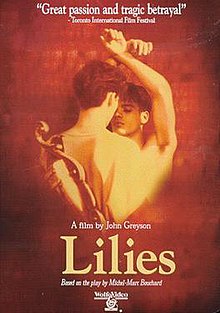Lilies is a play written by Quebec playwright Michel Marc Bouchard, which premiered in 1987.
Michel Marc Bouchard, is a Canadian playwright. He has received the Prix Journal de Montreal, Prix du Cercle des critiques de l'Outaouais, the Dora Mavor Moore Award for Outstanding New Play, the Floyd S. Chalmers Canadian Play Award, and nine Jessie Richardson Theatre Awards for the Vancouver productions of Lilies and The Orphan Muses.

Linda Gaboriau is a Canadian dramaturg and literary translator who has translated some 125 plays and novels by Quebec writers, including many of the Quebec plays best known to English-speaking audiences.

John Greyson is a Canadian director, writer, video artist, producer, and political activist, whose work frequently deals with queer characters and themes. He was part of a loosely affiliated group of filmmakers to emerge in the 1980s from Toronto known as the Toronto New Wave.
Matthew Ferguson is a Canadian former actor. He is known for his roles in On My Own (1991), Love and Human Remains (1993), Lilies (1996), and La Femme Nikita (1997–2001).

Far Side of the Moon is a Canadian drama film, directed by Robert Lepage and released in 2003. The film is based on Lepage's eponymous play, which premiered in 2000.
The 17th Genie Awards were held on November 27, 1996, to honour films released in late 1995 and 1996.
The Academy of Canadian Cinema and Television presents an annual award for Best Achievement in Cinematography, to honour the best Canadian film cinematography.
Danny Gilmore is a Canadian actor, who is best known for his role as Vallier in John Greyson's Lilies (1996), for which he received a Genie Award nomination for Best Actor at the 17th Genie Awards. He has also appeared in the films Gaz Bar Blues, Ice Cream, Chocolate and Other Consolations , Les Fils de Marie, Days of Darkness , Maria Chapdelaine and the French–Canadian TV movie Marie-Antoinette.
Curtains is a Canadian short film, directed by Stephanie Morgenstern and Mark Morgenstern and released in 1995. The film was a Genie Award nominee for Best Theatrical Short Film at the 17th Genie Awards in 1996.

Robin Cass is a Canadian film and television producer. He is most noted as the producer of John Greyson's film Lilies, which won the Genie Award for Best Picture at the 17th Genie Awards in 1996. He has also been a supervising producer for the CBC TV series Kim's Convenience.
Jason Cadieux is a Canadian film, television and stage actor. He is best known for his performance in the 1996 film Lilies, for which he was nominated for the Genie Award for Best Actor at the 17th Genie Awards.
Not Me! is a Canadian drama film, released in 1996. The full-length directorial debut of Pierre Gang, the screenplay had been written by Gang a full 10 years before he was able to make the film.
Linda Muir is a Canadian costume designer. Her studio is in Toronto, Ontario.
The Party is a Canadian drama film, directed by Pierre Falardeau and released in 1990. Loosely based on the prison experiences of convicted Front de libération du Québec terrorist Francis Simard, the film centres on the annual party at the St. Vincent de Paul penitentiary in Laval, Quebec, where a group of prison inmates get to enjoy outside entertainment.
Éric Cayla is a Canadian cinematographer. He is most noted as a two-time Genie Award nominee for Best Cinematography, receiving nods at the 17th Genie Awards in 1996 for A Cry in the Night and at the 18th Genie Awards in 1997 for Karmina, and a two-time Jutra Award nominee for Best Cinematography, receiving nods at the 2nd Jutra Awards in 2000 for Babel and at the 5th Jutra Awards in 2003 for The Baroness and the Pig.
Daniel Jobin is a Canadian cinematographer from Quebec. He is a two-time Genie Award nominee for Best Cinematography, receiving nods at the 12th Genie Awards in 1991 for Cargo and at the 17th Genie Awards in 1996 for Lilies, and a four-time Jutra/Iris Award nominee for Best Cinematography, receiving nominations at the 11th Jutra Awards in 2009 for Mommy Is at the Hairdresser's , at the 12th Jutra Awards in 2010 for Je me souviens, at the 14th Jutra Awards in 2012 for Coteau rouge, and at the 18th Quebec Cinema Awards in 2016 for The Passion of Augustine .
Sylvain Brault is a Canadian cinematographer from Quebec. He is most noted as a two-time Genie Award nominee for Best Cinematography, receiving nods at the 15th Genie Awards in 1994 for My Friend Max , and at the 17th Genie Awards in 1996 for Rowing Through.
Jean-Guy Bouchard is a Canadian actor from Quebec. He is most noted for his role as Tonio in the film Requiem for a Handsome Bastard , for which he received a Genie Award nomination for Best Supporting Actor at the 13th Genie Awards in 1992.
The Feeler is a 1995 Canadian short drama film, directed by Colleen Murphy. The film stars Randy Hughson as Danny, a blind man who must rely on his sense of touch to navigate the world, and Victoria Snow as Lina, a care worker who comes to read books to him.




